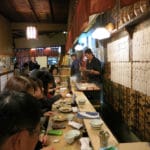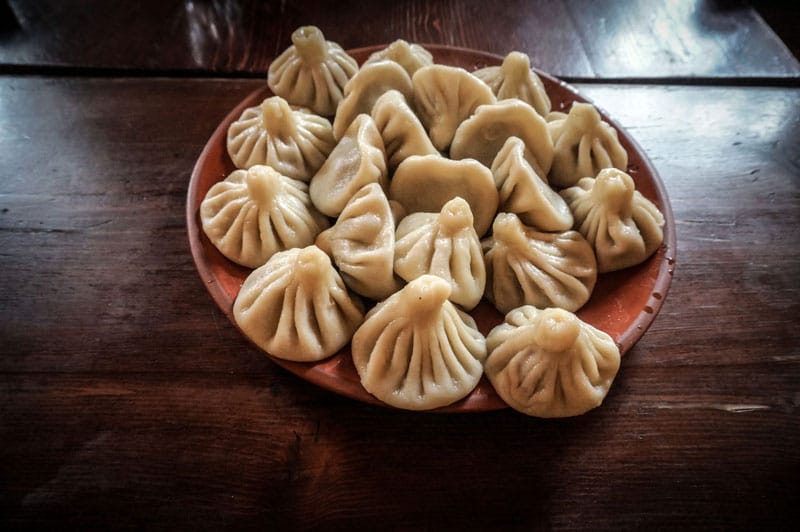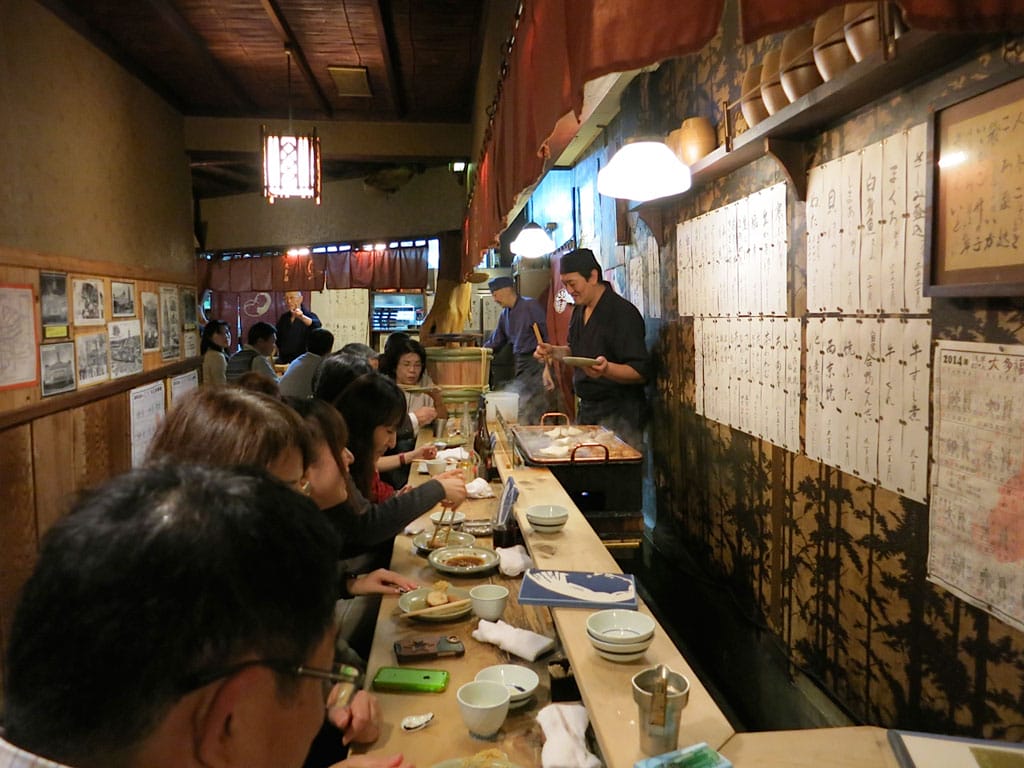Someone once said that humanitarian workers are like mercenaries, missionaries or madmen. It is a description we have also applied to expats who end up in far-flung places like Georgia. Like the foreigner out in the secluded Kakhetian village of Argokhi, between the Alazani River and the Caucasus Mountains, who has forged his life growing a nearly extinct variety of native wheat and baking it into bread; but he is no madman. He’s a Frenchman.
We had first heard about Jean-Jacques Jacob some years ago while visiting the Alaverdi Monastery in Kakheti, when a friend pointed north of the giant cathedral and told us of a Frenchman who had started a farm in the middle of nowhere. Later, we heard the same French guy was selling bread and cheese at a short-lived weekend farmers’ market in Tbilisi’s Vake neighborhood. We finally met him in a Vake alleyway where he sold his bread and organic produce from a trailer twice a week.
He’s come a long way: Today we are sitting in his new shop called Au Blé d’or (“Golden Wheat”) in Vera, chatting over coffee, rye and wheat bread slices and a brioche. There are shelves with organic beets, potatoes, green beans, apples, onions and little pumpkins. On the opposite wall are tables with honey from a beekeeping friend who has hives spread across the country, herbal teas, organic juices and jams, and natural soaps. A counter fridge displays artisan cheese from Marleta, Alpuri Qqro (Swiss alpine cheese made in Georgia by a Swiss couple), Tushetian guda from a neighbor in Argokhi, and his friend Tamaz’s fresh cow’s milk varieties, including the cream cheese we are spreading on our brioche.

Jean-Jacques grew up on a Brittany farm and left home to study chemistry, philosophy and physics in France and Germany, and picked up woodworking along the way. “Since I was young I was always searching for the meaning of life,” he says.
He learned of Ibrahim Abouleish, an Egyptian philanthropist who was also a revolutionary advocate for biodynamic farming and established sustainable models for irrigation-free agriculture in the desert. “I wanted to go visit him but I got a job offer in Switzerland. While on the plane I realized it would have been dishonest to take a long-term job I couldn’t totally commit to. I felt there was something else to do, something pulling me. It was April 14, 2005,” the Frenchman recounts.
When he returned to France, a friend asked him to drive her to Georgia, where she planned to work with an NGO. By June, his fate was sealed. Jean-Jacques met a local guy involved in eco-agriculture who shared bread he had never tasted before made from an endemic grain called tsiteli doli – red wheat. For Jean-Jacques, who suffers from gluten insensitivities, the natural gluten-free bread was a revelation.
Georgia has made a name for itself as “the cradle of wine” but few know that it is also the world’s first breadbasket – one of the places where the cultivation of wheat began.
Georgia has made a name for itself as “the cradle of wine” but few know that it is also the world’s first breadbasket – one of the places where the cultivation of wheat began. Fourteen of the world’s 27 wheat varieties grow in Georgia and five of them are endemic. Even the language has preserved ten names of ancient cultivated wheat varieties. However, decades of industrialization have devastated this heritage and endangered most of these species, while Georgia imports 85 percent of the grains it consumes.
Jean-Jacques says in Georgia he felt the “freedom to create an environment where humans are at the center.” In April 2006 he bought land in Kakheti and with the help of Elkana, a local biological farming association, became the first person in the region to seriously cultivate tsiteli doli, which he mills himself.
“I never baked bread before, but started making French-style bread and saw how people liked it,” he says.
The amateur baker had also never farmed before, but embraced the philosophy of sustainable farming wholeheartedly, not only of wheat, but other vegetables too, and developed a loose co-op of sorts with close friends like Tamaz the cheesemaker.

“Wheat shows what real economy is,” Jean-Jacques says, becoming more animated. “You have one seed. You can put it in your pocket and save it and you will always have one seed. But give it to the earth and it multiplies. One stalk gives you 100 to 150 more seeds.”
The more people understand basic agro-economics, Jean-Jacques argues, the less problems we will have as a society. It all begins with the soil. Respect it and it provides quality that you taste sitting in a restaurant. Chemical pesticides and fertilizers kill the earth and the food it produces. “The more [chemicals] you use the less respect you have for life,” he affirms.
Georgia is fertile ground for sustainable farming. We are seeing a growing movement of organic winegrowing in the regions, and thanks to Jean-Jacques, more people are learning of tsiteli doli and other indigenous grains. Some are cultivating them and others are using them for breads in their restaurants.
“We are creating new prospects,” Jean-Jacques says. While we have been chatting, his partner, Khatuna – who, according to Jean-Jacques, has made all his work possible – has attended to several local customers buying breads, veggies and cheese. “When I came here I never thought I would ever be growing wheat,” he adds.
 November 1, 2018 CB on the Road
November 1, 2018 CB on the Road
While most artisanal markets and mom-and-pop groceries throughout Japan have given way […] Posted in Tokyo March 8, 2016 The Khinkali Chronicles, Part II
March 8, 2016 The Khinkali Chronicles, Part II
In Tbilisi, we have mornings when we wake up wrinkled and dehydrated, and as we lie in […] Posted in Tbilisi December 30, 2016 Otafuku
December 30, 2016 Otafuku
The weather is turning cold and Japan’s convenience stores, or konbini, have hauled out […] Posted in Tokyo
Published on October 15, 2020
Related stories
November 1, 2018
TokyoWhile most artisanal markets and mom-and-pop groceries throughout Japan have given way to large supermarket chains and convenience stores, Kyoto still boasts one of the last markets selling local delicacies along with fresh foods and housewares. Often called “Kyoto’s Kitchen,” Nishiki Market is not like traditional huge bazaars with stalls selling fresh vegetables, fruits and…
March 8, 2016
TbilisiIn Tbilisi, we have mornings when we wake up wrinkled and dehydrated, and as we lie in bed knuckling the sleep from our eyes, we hear an all too familiar chorus beckoning us to “bite me, slurp me, gobble me down….” That is khinkali singing, and when you hear the melody, your day has been…
December 30, 2016
TokyoThe weather is turning cold and Japan’s convenience stores, or konbini, have hauled out the oden service pans and positioned them next to the cashier counters. For those not familiar with oden, the sight of assorted flotsam and jetsam afloat in a clear broth and the fishy aroma impinging on their space while paying for…



















































































